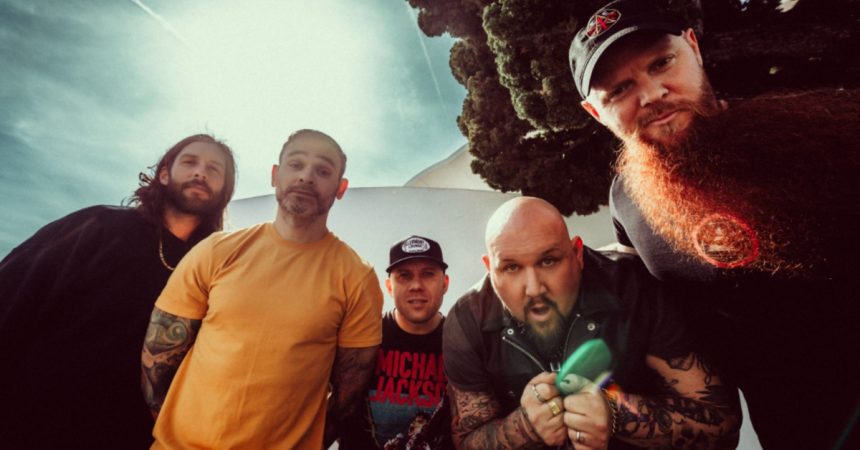Huntington Beach’s Atreyu have been a beloved force within the heavy music world for over two decades. Across eight albums, the band have brought metalcore to new heights, dismantling the boundaries of genre, and bridging the gap to hardcore, pop punk, and anthemic ‘80s rock with grace and intention. Like many bands that surpass the decade mark — and most who are lucky enough to reach two — Atreyu have adapted over time, seeing changes in both their lineup, lyricism, and sound through the years, which have been both painful, and fruitful, for those involved. For better or worse, these shifts and growing pains have propelled Atreyu staunchly into the present, where they have been forced to reckon with what the future holds, and what they hope to create there. And what they hoped to create came to be in the Seasons of Life project.
Read more: 15 contemporary mathcore bands bringing the genre into the future
For this project, Atreyu set out on a bold and beautiful journey, one which culminates in a full-length later this year — The Beautiful Dark of Life. And in anticipation, the band have been releasing EPs full of “Easter eggs,” offering a taste of what’s to come, and insight as to where their heads have been at, amid the new paths they’ve proceeded forth on — and it’s heavy, no pun intended. From spring’s four-track EP, The Hope of a Spark to today’s EP, The Moment You Find Your Flame, the band have been unveiling their work piecemeal, both with a modern, tech-savvy audience in mind, but also with the band that is Atreyu today in mind. Packed with heavy riffs, each self-reflective track overflows with ocean-deep lyricism. Out of the many messages Atreyu are trying to convey, it seems that letting go of negativity and moving forward are the ones to home in on.
Before they leave on a tour with Memphis May Fire, Godsmack, and Iron Maiden later this month, we got the chance to sit down with frontman Brandon Saller and bassist Porter McKnight about their foray into this conceptual project, the recent EPs, and how they’ve created a safe space within their band.
So each EP release you’ve been putting out is part of a larger project, a full-length that you guys are working on, which I’m super interested in because I’ve been told it’s “a concept” more than an album.
BRANDON SALLER: I love this project. Because the “concept” did come almost after the fact. I think a lot of people will come up with a crazy concept and then write music around it, but we started writing music and realized what it was, and the categories which it fell into, and then came up with the concept. It really just created itself. It was initially born from an idea and a desire started by Porter and escalated by Dan [Jacobs, guitarist], I would say, of wanting to do things just a little bit differently in realizing the landscape of how fans ingest music, in a technological age.
MARC “PORTER” MCKNIGHT: We wanted to do something that would drip-feed songs a little bit, which was Brandon’s desire. We were like, “Why don’t we try to do some EPs?” That allows people to digest chunks at a time. If you look historically with the same technology that we have access to, you see Baptize, for instance, I don’t know what it is exactly, but let’s say song six through 11 — nobody fucking listens to these songs. And in our minds, those are some of the best songs we’ve ever written. It’s just a shame that if there’s not a video or major single, the spotlight just skips over it.
So let’s divide these songs into three. How can we do three things? What can we do thematically? I mean, human nature is all about trinity. Holy Trinity. Well, we could go on and on about that, but how do we do that and not be cheeseball? Well, there is a grander reveal that I don’t want to reveal here, but I think we are starting.
SALLER: We also started to realize that a lot of these songs were, what we call the Seasons of Life. It’s about that ever-changing and ever-repeating cycle of bottom to top and then over again and over again that happens to everyone as humans. You always find a low, and then you find a way out of that low, and then that light sheds on a better part of life.
And you think that’s the top. But there’s always something greater. And unfortunately, sometimes there’s always lower, the lower than you thought was the lowest last time.
MCKNIGHT: But also, learning from all of those experiences has merit. This whole, this EP project, building into the full-length is that path, of an artist and of a human. For us, it’s creative, but it’s inherent in human nature to try to find yourself. For me personally, whenever I found that spark and followed it, everything great in my life has happened, right? The hope of a spark is just trying to figure out some way out of the fucking brutality and darkness of your mind or the situation, whatever it may be. The moment you find your flame is when you start to figure it out. There’s a direction, and it’s starting to unfold, and you’re still gonna peel back the layers.
SALLER: Dude, you just dropped so many Easter eggs that I can’t even understand it. The greater concept is that it’s funny that we all revealed to ourselves that a lot of our songs have the same sense of resolve. Like Porter said, whether you’re at the place of absolute zero desperation just lost, or whether you are just starting to find a glimmer of hope, ask yourself necessary questions, or choose a path — you’re succeeding, you’re feeling better. Whether that goes for your career or your love life or your mental health, physical health, or anything.
It all leads into the final product — The Beautiful Dark of Life, and we signed the painting with that. The inspiration comes from the most random places. A couple of years ago, I was walking, me and my wife and my kids. I had my oldest daughter, who at the time was about 4, on my shoulders. We walked under this overhang, and she pointed to the shadow, and she said, “Dad, what’s that?” I said, “Well, those are shadows,” and she takes a sigh. And my 4-year-old says, “Shadows are the beautiful dark of life.” Oh, my God. I lost my mind immediately and put it in my phone. Then we were in the studio writing the song, which would become “The Beautiful Dark of Life,” which is about living, really, whether you’re enjoying this life or fearing this life. It’s about growth. It’s about all these things. We needed a line and something stabbed me in the back of the brain and was like, “Wait a second.” I scrolled through my phone, and almost I was afraid to say it in the room with my friends because it’s this thing my daughter said two years ago.
But in this band, I think that we have all created a place where we all feel very safe and confident to speak and try whatever we want to try. There’s no judgment in this band. So, I was like, “What about The Beautiful Dark of Life?” And everyone was just like, yes. When it came to like tiling the record, it was like, “This makes perfect sense, right?” So it all just tied together.
This album, and approach, feel very emotional and like real growth. When I find myself around bands that have been together for 20-plus years, there are definitely some who I notice have gone through a maturing process along the way, and some who haven’t… Just in itself, it’s hard to stay together as a band for multiple decades, to keep the space safe and sacred. I know you guys have experienced a lot of change over the years. What do you feel is different in how you made this album?
SALLER: We’ve never been a band that’s super judgmental. There’s never been one dude in the band like, “If you don’t like it, you’re fucked!” We’ve never been like that. But I think that things were a lot less five-sided than they are now. And that it was really paramount for us at the moment, with the kind of changes that we more recently have had, to realize that everyone really needed to have the ability and the comfortability to put everything that they wanted into this band onstage, and offstage in the studio. Everyone really stepped up in ways that blew us all away. There’s abilities that have come out of Porter and Dan and Travis — guys who I’ve been in the bandwidth for 20-plus years now. It’s like they’re pulling new rabbits out of hats that I’ve never seen before. It all just comes from being comfortable. Creating art is one of life’s most vulnerable places. You bare your soul. I wanted to make sure we could all do that with each other.
It turns out we’ve really turned into a bit of therapy for each other — because a lot of us are living the same shit just in a different house or on a different day in a different town, much like the world is. Before, where your problems were your own and you dealt with them, we all really lean on each other now, and it makes that writing space that much more comfortable because you’re not afraid of being judged. I think that also comes from the fact that we also have a common goal more than ever — what’s best works. You take the ego out of it. There’s parts on this new album where we’d be like, “Who’s gonna sing this part? Me, or you, Porter?” And we both go in and do it and then say, “OK, you sounded better. So you’re singing the part.”
What are your favorite tracks from the album?
MCKNIGHT: I have four songs because I haven’t been asked this question yet. So here we go: “Come Down” is one of the greatest songs we’ve written in a long time. A song called “I” is fucking incredible. It feels fresh, and it feels current, and it’s digging deep in all the ways possible. There’s a song called “Insomnia” that is really unique for us.
What do you mean by that?
MCKNIGHT: It takes you on a journey that takes you like nothing we have now. The soundscape and the lyrics are both so different. I feel like “Gone” is like The Greatest Hits of Atreyu, smashed together, with a little bit of icing on top of that cake. But overall, “Drowning” is still my favorite song. I fucking love that song so much. OK, five songs.
SALLER: Mine’s not far off. “Drowning” is one of those benchmark songs. If I had to tell someone who’d never heard the band what songs they should [listen to], I would tell ’em three songs. One of them would be “Drowning.”
What would the other two be?
SALLER: “Becoming the Bull” and “Blow” because you’d get heavy, you’d get anthemic, the ’80s part and the lighthearted part, and then “Drowning.” You get all of it. But with all due respect to our history, I think this is the best stuff we’ve ever done. It’s the most honest. It’s the most real. It’s intricate, it’s light, it’s fun, it’s heavy, it’s emotional, it’s fucking everything. It truly is.









